
Thirteen seasons, four spinoffs, and seven international versions later, BeBe Zahara Benet still stands tall among the scores of artists who have competed on Drag Race.
The elegant, Cameroon-born performer (real name Marshall Ngwa) rose to fame as the first-ever winner in the inaugural season of RuPaul’s Drag Race. He returned to the show with Drag Race All Stars Season 3 in 2018. Following his success on Drag Race, Benet went on to release three dance albums, appear in the digital series Infinity Train, and tour the world with his act, occasionally collaborating with other Drag Race alumni, including Bob The Drag Queen, Peppermint, Shea Couleé, The Vixen, and Monique Heart.
Now Benet collaborates with first-time feature director Emily Branham on Being BeBe, a new documentary film tracing Benet’s career over a 15 year period. The film, under Branham’s eye, follows Benet as he prepares for Drag Race, enjoys his first rush of international acclaim, struggles to find work, and rises again. The film also examines the effect of Benet’s success on her native Cameroon, where homosexuality remains very illegal. It’s a naked look at a consummate performer, reluctant activist, and intensely private person fighting for a career in showbusiness.
With Being BeBe set to close out the Provincetown International Film Festival this June 23-25, we caught up with Benet and Branham to discuss their unexpected collaboration, the film’s lengthy gestation time, and BeBe’s ongoing career. Being BeBe screens in person and online as part of the Provincetown International Film Festival through June 25.
How about we take this to the next level?
Our newsletter is like a refreshing cocktail (or mocktail) of LGBTQ+ entertainment and pop culture, served up with a side of eye-candy.
So this is a film 15 years in the making. Emily, why BeBe?
EB: I mean, I don’t feel like I found BeBe. BeBe crossed my path by way of my sister who was dancing backup for him for his first national drag pageant. I live in New York, but I’m originally from Minneapolis. My sister was there and had answered an ad for backup dancing for a Cameroonian drag queen. I thought that sounds like an amazing short film.
Interesting.
EB: Then, three years later, RuPaul’s Drag Race happened. I thought maybe that’s my ending. So I pushed really hard to finish it at that time, but it hadn’t covered enough scenes unfolding to give it the depth that I knew it needed. And I didn’t have any money, so we’d dip in and dip out. And BeBe’s story kept unfolding in ways that I kept following and pivoting. Then things got really interesting in 2014. BeBe called me up—he was living in New York. Things weren’t going the way he needed. He said, “I’m going to try one more show, but if it doesn’t move the needle in the way I need it, I’m going to move out of New York.”
Wow.
EB: Now that’s dramatic. Cinematic. That’s a story I could capture unfolding. I just really wanted to make a wonderful documentary about BeBe’s journey. He’s a good friend now, and I care so much about him and his family. And it felt like his story could inspire people who may not know or care about Drag Race. It felt worth it.
BeBe, how do you feel about finally putting it all out there?
BZB: This time around, David, I said I would take time to enjoy the moment and be present. I feel like what has always happened to me in the past when I’ve had things happen like, for example Drag Race—I’m always like what do I have to do next? It’s always work-mode non-stop. So every time I think of those things, I don’t even remember those moments. This time I’m trying to take time.
That’s wonderful.
BZB: You know, when the process started, she came just to document a national pageant. But when Emily got there she realized my story was so different from others. I have a different point of view, a cultural background. Back then, I don’t think I took it that seriously. After Drag Race when my career really took off everything was so intense. And there was no blueprint for me, no guidance. So when I look back now, I’m like I feel like it will give people an opportunity to get closer to me in a way. I don’t feel like fans or supporters really know me. They know what they see on stage. They don’t know my drive, my background, my family.
Right.
BZB: So I’m a little anxious. People get to see me more intimate and vulnerable. They really get to see different sides of me. And I’m very proud. It’s a story that needs to be told, and I’m hoping that people will take so much from it. At the end of the day, I feel like the drag aspect is a tiny aspect of the picture. And you don’t have to be an artist to take something from the story: perseverance, dedication, love, belief, dreaming…everybody can take something. That’s what I’m proud of.
What was the biggest surprise in just getting to know him, Emily?
BeBe is full of surprises. What I think surprised me in the beginning was just what a homebody he is, how wholesome. He doesn’t drink. He doesn’t smoke. He’s very private about his love life. I think if he didn’t work in a nightclub he wouldn’t be someone who goes out and parties. That’s not his nature. And he’s just so warm and connects with people in such a genuine way. You wouldn’t necessarily expect that from a grand performer. Those contradictions were really interesting to me.
How did Emily convince you to to along with it BeBe?
BZB: It was a battle.
[Laughter]
It was a battle. At first, I was like ok, let’s do it. But I did not know to what extent that would come to my personal life. And I protect my family, I protect my relationships. And my family does the same thing. I had to find very interesting ways for my family to be documented. So I build trust with Emily, and really believe she was doing the right thing. We had a lot of conversations and got to know each other really personally. And it was a battle over the 15 years. There were times where she would say “I need to capture this,” and I’d be like nope.
[Laughter]
One thing I’ll tell you about Emily is her perseverance. She did everything in her power to tell this story, and be honest about it.
It’s interesting to me in looking at the film that it almost starts as a “where are they now” kind of film. But very quickly it becomes something else. How did your scope evolve?
EB: I think just by the nature of taking as much time as it did, and by what I was relating to—how important persistence is in a creative career—that just became the major storyline. As a performer, stories don’t always follow straight lines. You can peak early in your career, and have another peak later. There is nothing predictable. It’s how much work you put into it, how much you keep working. I thought that was something everybody could relate to. And having values in life and your career that you need to overcome—that’s tremendously relatable. It became the most interesting part of BeBe’s story.
BZB: I feel like that’s one way people can relate to it. And that’s in any job: we all go through rollercoasters in our careers. I feel like people can take a lot from that.
One thing I found so compelling about this film is that this is a portrait of an artist really pushing himself to new levels, and someone who became a reluctant activist. Was that always your intention?
BZB: Even before Emily came into the picture to document my story, I made up my mind I was an artist. When I came to this country, I came to go to school. African families, when they send their children here, it’s to better our situation and be well-educated to become doctors, lawyers or engineers. That was not my calling. I had always known, from a very, very young age about my gifts. I didn’t know what form that would take, but I was very aware.
Right.
BZB: When I came to this country to go to school, I was unhappy. I knew there was so much I was being called to do. So I told my parents “Hey, listen, I’m an artist and I want to develop my craft.” Once I made that decision, I started working hard to find myself, whether that’s in music, in fashion, or in drag. I turned down Drag Race twice.
Wait, really?
BZB: Yeah. The first time the opportunity presented itself to me, I was out of town doing some work. The second time they came around to do auditions. They called me up and asked me to audition. I said, “Ehhh.” And I never did. The third time, I was performing “Circle of Life” from The Lion King, and RuPaul was in the audience. After the show, he wanted to talk to me. He said, “Listen, I’m working on this show. I think you’d be a good contestant.” And the rest is history. And I say all this to say I’ve been working hard to create a brand, even before Emily came into the picture, even before Drag Race. Drag Race just boosted it.
So, Emily, then when you are dealing with years of footage and considerable archive footage as well, how do you find a narrative? Do you go in with the story mapped out, or do you find the story in the footage itself?
EB: Man, I wish I could tell you how it came together. It was magic and a whole lot of work.
[Laughter]
I think one thing I learned by 2013-2014 that I didn’t know when I started in 2006 is that it’s not about entering a cool situation with a bunch of cameras and just turning them on. You need to go in with a plan, even though that plan will inevitably change. Life intervenes. But if you don’t go in with some plan that you can modify, you’ll end up in trouble. I feel like I made every mistake I could make early on because I didn’t really know what I was doing. I’ve learned so much and gained so much respect for the masters of the form. Documentary is so challenging and inefficient. But there’s also something special about meeting new people and entering spaces you wouldn’t otherwise.
You also have said you re-edited the film several times to be true to BeBe’s story and to avoid any feelings of appropriation in the film. What kind of changes did you make?
EB: There’s so much there. It changed shape so many times. Before BeBe returned to do All-Stars, the shape of the film was not as hopeful and uplifting. It was very realistic: sometimes we chase dreams and they don’t go our way. That’s normal, and we all go through it. But when All-Stars happened, it would introduce BeBe to a new generation of fans. And that’s so much more hopeful. But even then, it felt like there was something missing. So that was part of the reason to go to Cameroon.
You’re very private, BeBe. How did Emily convince you to show your family?
BZB: I’m super close to my family. When I was growing up, my family never made me feel any different than I how I was, and I mean in Cameroon. Being a different kind of person, I never found anyone that looked like me, talked like me or was interested in what I was interested in. I was like an alien, but my family never made me aware of those things that made me different. I say this because my family and I are very private, and we protect each other.
Sure.
BZB: But I thought it was important for people to see not every black story or every African story looks the same. There are so many stereotypes. I thought it was very important for people to see a family that might not understand everything, but still loves and supports you. So you had to see that landscape to see where I come from and the kind of human being I am. It’s a little glimpse of where I come from.
EB: Even when it became clear that BeBe’s family wasn’t comfortable with me filming them, I still felt I heard these [internal] whispers do it anyway. And again, embracing the magic when I reached out to everyone in Cameroon to ask if they knew LGBTQ activists.
That’s a bold thing.
EB: I connected with amazing individuals there. It was just about following instincts and learning to be a better ally. It’s easy to forget with all the progress we’ve made in the US—even though we have further to go—other countries have much further to go in terms of awareness and acceptance. I guess that was another reason to [rework the film]: just to see it do the most good it could do.
BeBe, you have become their north star in so many ways. What does that mean to you?
BZB: Well, first of all, I never signed up to be a role model. I don’t feel like that’s something you think about. But I do feel like with what’s been given to us and the path paved by others—because we are riding the backs of others that made it possible for us—it becomes a privilege. And with privilege comes responsibility. That’s why it’s important, no matter what we do with our art, we should help move humanity forward. That sounds like a pageant answer, but I really do believe that. It’s our role to move humanity. Looking at the young people in Cameroon, the whole idea of talking to them and inspiring them is to show what’s possible.
Wow.
BZB: Things change, things evolve. And there are ways to still live out loud. When I lived in Cameroon, I sure lived out loud.
[Laughter]
BZB: I’m a very spiritual person. I feel like we’re all gifts to a higher power. Having those kids look at me and hearing them say “Oh my gosh, it’s possible. We can still live. It’s ok to dream,” I hope they can take that lesson.
Of course.
EB: A lot of the themes you see in the film—apart from the 2020 interview—were there. But last summer we came up with this idea of doing the core interview from Minneapolis where BeBe lives and I am from in the wake of COVID and the atrocious violence against George Floyd, which we are all still grieving about.
Yes.
EB: We used it as a point of reflection to look at BeBe’s career, and to connect with the people in Cameroon. I feel like we stumbled in the dark, and then it all came together last summer.
You touch on so much there. To the subject of Cameroon, and the LGBTQ activists you do interview there—they are taking a huge risk in talking to you, even anonymously. In your observation, Emily, what is it about BeBe that they find so inspiring?
EB: I mean, I think to them it’s a marvel that you can get away with performing in drag in the US. To see someone from Cameroon doing that is just a thrill. There’s a line that I cut out of the film. Mark Lambert Lamba, the Cameroonian activist you see in the white robe, when he saw BeBe perform in a clip, he turned to me and said “Is this drag queen gay?” I said he really didn’t like labels. So he turned to his friends and said “In the US you can get away with not saying you’re queer. We know he’s queer.”
[Laughter]
But, I feel like poking at it from different angles, you get a better idea of who BeBe is what his resistances are, and why they are there.
Well, let’s talk more about that. The other question I sort of have about that—you don’t like labeling yourself, BeBe. Is it odd to be a queer hero without necessarily thinking of yourself that way?
BZB: I have always been that way in terms of labeling. That has never changed, that will never change. We are all human beings. I feel like labels tell you how to treat me.
I know what you’re saying.
BZB: There’s nothing wrong with people that want labels. But for me, I’m just Marshall. I’m just BeBe. I’m just a human being who loves who he loves. But if someone labels me, however, and that’s just the way they process me, that’s ok. I don’t have a problem with that. But when it comes to me, I don’t like the labeling and the coming out process. Why do we have to do that? Nobody comes out as straight. Why do I have to come out? When do we just become human?
Wouldn’t it be nice?
BZB: It would be. And you can create that in your own world.
Are you in touch with anyone from the community there?
BZB: I am, definitely. But I always keep that private. I support initiatives to help the community, but you have to travel with care. We have to be cautious.
It’s just encouraging to hear you’re still in touch. This is a film of highs and lows. What do you realize about yourself in revisiting so much of this early footage?
BZB: I realize I’m very strong-willed. I realize I’ve always been a visionary. I’ve always worked very hard to make my purpose come to life. I realized I’ve always been aware of my gifts. Even when you go through highs and lows in your career, if you’re living and breathing, when you get the lows, you’ll bounce back. You know how many times I’ve wanted to quit drag?
I can only imagine from the heels if nothing else.
BZB: Girl, I put on a lash and I’m like, ok, I’m done.
[Laughter]
BZB: Time to retire! But there’s always been a reason to keep going back. That’s why I always tell the young ones, “When I started, I had to decide what I wanted to do in the first place.” I needed a vision board to see where I was going. And I accomplished those things. And you have to evolve, but I’ve done the check marks on my vision board. When you go through the lows, it allows you to maneuver through. It allows you to take more licks.
This is your first feature, Emily. How do you feel like you grew in making this film? What did you learn the most?
EB: Oh my goodness, so many things. I think I learned a lot about documentary storytelling. I’ve become a devoted student of it. In 2010, I was so frustrated that I hadn’t finished the film, I entered a contest to make a documentary in five days. I ended up winning that contest. As a result, I got to go to amazing documentary film festivals around the world and see incredible films that I wouldn’t have seen. It really informed all the different ways a documentary can be made. There’s no “right” way. I loved that, and I loved learning to follow my intuition. You have to make so many judgment calls. Trusting my intuition became one of the biggest elements of making the film. It gave me more confidence.
You started your career as an actress, primarily on stage. What kind of creative satisfaction do you get from directing that you don’t get from acting?
EB: What a nice question. I think in making a film about a performer, I get to translate all the passion I have for theatre and artists of all kinds, who I get to lift up. I will be very, very happy if I make films about artists for the rest of my life. It’s just really satisfying to have a product I can look at for the rest of my life. Theatre is more ephemeral. It’s really fun to have something to look back at.
Do you think that’s the source of your kinship with Bebe—that you’re both performers? Let it also be said that most of your work as a director and producer deals with other performers.
EB: I wonder if that’s part of where we identify with each other. I think there’s definitely a kinship around a sense of ambition. He’s been far more accomplished in his accomplishments. But I identify with his ambition, his work ethic, and more than that, our love for our families. I too am really close with my family, and the film was an excuse to spend more time with my family in Minneapolis.
And what’s next for you?
BZB: I’m just trying to find ways to be the best version of myself. I still want to do a lot of music. I want to go back on tour now that things are opening. I’m very proud of Nubia; I can’t wait to bring that back. This year I’m also launching the House of Zahara. It’s going to be a collection of artists. Like I said, when I was growing up, there was no blueprint for us. As artists, we need each other. So I want to create my own artistic family and mentor young ones coming after us. And I want to do more TV work. I’m having conversations. I just want to evolve.
Being BeBe screens in person and online as part of the Provincetown International Film Festival through June 25.


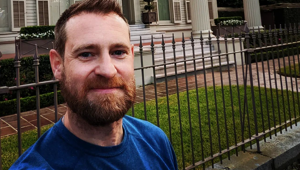
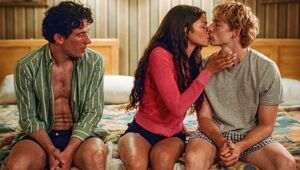
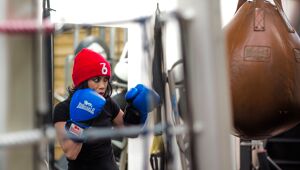
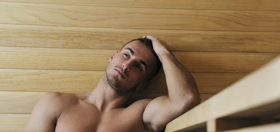

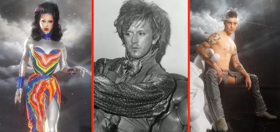
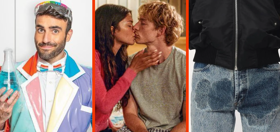
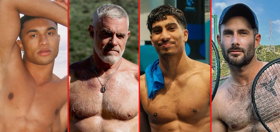
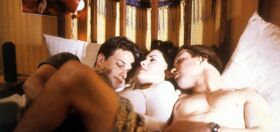
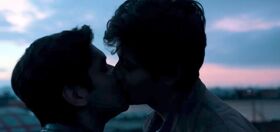
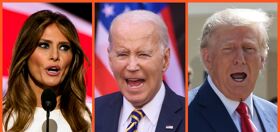
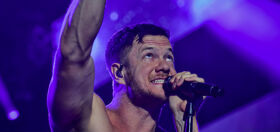



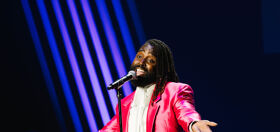
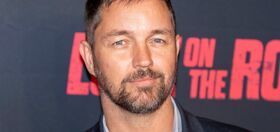
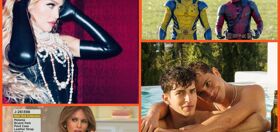
Hdtex
I’d watch, but I’m washing my hair that night.
Leash
OUUH shots fired, sick burn bro! I don’t think Bebe will be able to recover from thi- oh wait, she doesn’t even know you exist. Hmm maybe she would if someone made a documentary about your life, but i guess they only ask interesting people. 🙁 too bad
LegionKeign
She always seems so bored with everything.
I didn’t think she should have won RPDR, she has zero creativity, uniqueness, nerve or talent.
Nina Flowers ALL THE WAY!